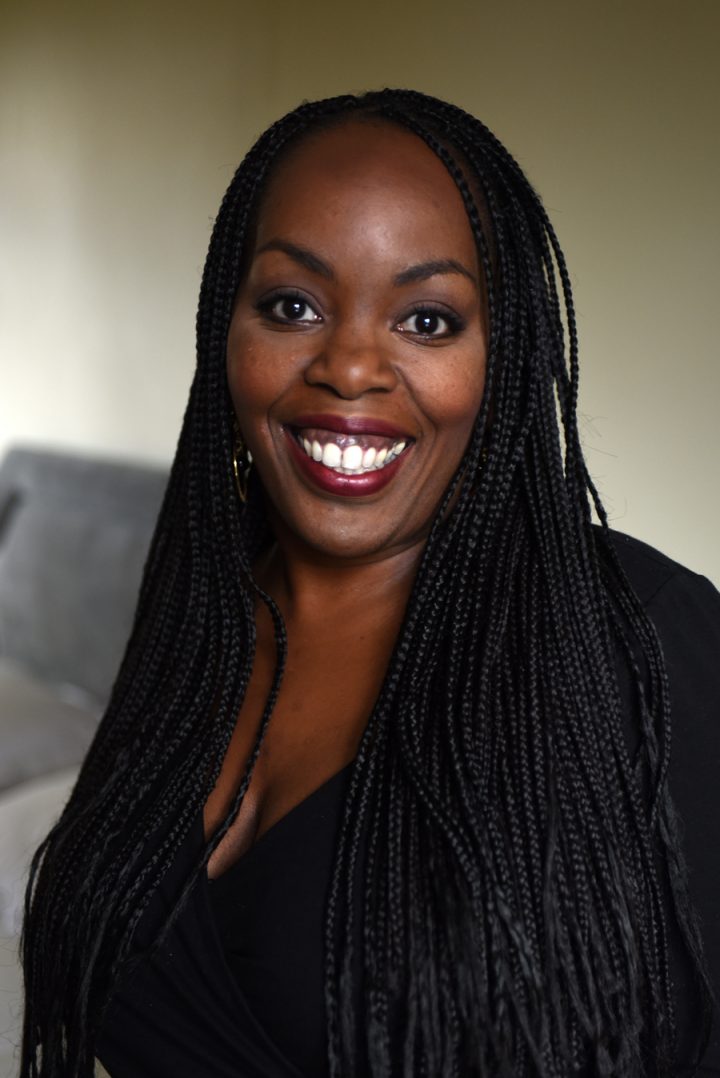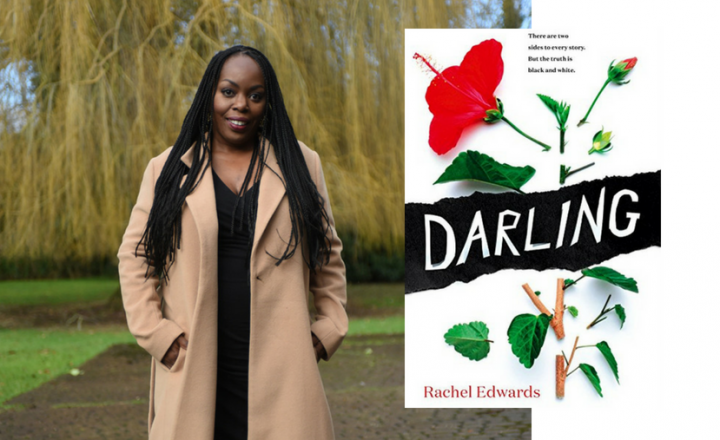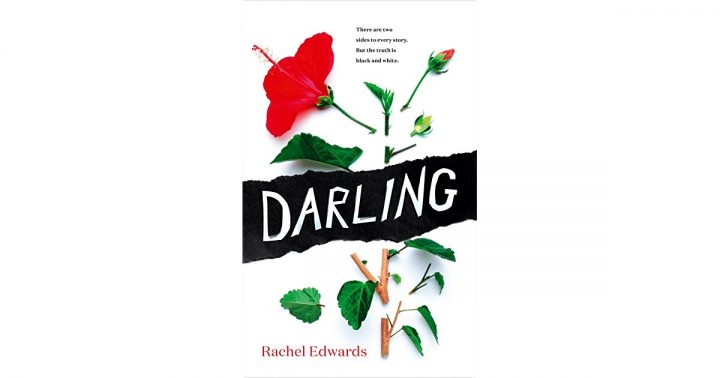Within days of the Brexit referendum in June 2016, 42-year old Rachel Edwards experienced blatant racial abuse for the first time in her life, and while it left her shaken, some good came out of it as the encounter sowed the seeds for an idea for her acclaimed debut novel, Darling.

Two years later and she is celebrating the launch of Darling, which has been described as “Dark, provocative and a refreshing take on the psychological thriller genre.” She has also been named as one of The Observer’s: “promising British first-time novelists”.
Our editor, Joy Joses, described the book, which centres around a white teenage girl clashing with her new black stepmother, with tragic consequences, as extremely thrilling. Rachel took time out of a busy promotional schedule for us to interview her. Here she talks about the writing process, her experience of racism and the process for getting her novel published.
What’s your career background?
Before writing fiction full-time I was a freelance writer for around 12 years. I wrote everything: articles for women’s magazines, marketing copy for big blue-chip companies and little start-ups, travel pieces, everything. The internet has made writing for a living so much easier. The one thing I never did as a freelancer was ghost write anyone else’s fiction. To me fiction was too personal, too precious to write on behalf of anyone but myself. It still is.
Before writing, I had a few peripheral publishing jobs, one marketing job and at one point I was an international IT head hunter for a couple of years (which meant lots of early morning flights, but some nice hotels). That feels a bit random now, but I’m glad I had the experience. Whatever my job, I was always ultimately aiming to be able to write fiction full-time: that was always my vocation.
Why did you want to write this book?
I wanted to create a black British female character who was interesting, complex and memorable – not simply ‘good’ or ‘bad’. I wanted my lead characters to face challenges and for readers to consider how they have come to be how they are. Plus, I am half-Jamaican, half-Nigerian and British born and I have always believed some of the realities of being black and British have not yet been documented enough in literature.
Darling, as a stepmother, which I also am, came to me and then… boom! The total shock of the Brexit vote. I stayed up all night, watching in horror and at 5am I emailed my agent, saying “Holy hell and NO!”. Many things struck me in that dawn light – and one of them is that it felt like a critical time for someone who was black, British and born of immigrant parents. A couple of days later, I was racially abused in a nearby town – unheard of before the EU referendum – and I started writing Darling soon after.

Was the process to find a publisher difficult? Can you explain how you went about it?
I knew that the key for me would be finding the perfect agent. It is virtually impossible to get a publisher, let alone negotiate all the complex business of being an author, without an agent. I had a copy of the Writers & Artists’ Yearbook and went online to research the best literary agents. I knew Joanna Swainson was the one for me. I had a book I had worked on before Darling – Joanna signed me because she loved my voice, but she knew that book was not the one to debut with. I wrote Darling soon after and that drew interest quickly. When I spoke to Anna Kelly, now my editor at Fourth Estate, I knew that she totally got the book and besides that she was incredibly insightful and sensitive as well as intelligent – it was a match made in heaven! I could not be happier to be with Fourth Estate, which is a HarperCollins imprint that also published Hilary Mantel, Jonathan Franzen and Chimamanda Ngozi Adichie. But I would not have got there without my dream agent, who found me my dream editor. It is true that the process of being signed by a publisher is far from easy and you must not underestimate the rejection you are likely to face along the way. But if you are truly a writer you will get there, and you just have to keep the faith.
How did you find the actual writing process, can you talk us through it?
I adore writing, every aspect of it. One of the reasons that Darling came about was because my step-children, who I had raised with their father full-time, had reached 18 and suddenly I gave myself permission to devote all my energy to writing. I had headspace. I had time. Writing Darling I found that I first of all needed a brand-new notebook in which I would keep every thought that popped into my head. The actual novel was written on my laptop, in Word. Another really handy piece of kit was a smaller bedside notebook, just in case a brilliant thought struck in the middle of the night! Apart from that I just wrote, flat-out, for eight months. If I woke up at 5am, I wrote. If I didn’t get to bed until 2am, it didn’t matter. Writing became the priority and I didn’t count words-per-day, I just wrote every chance I got until it was done. Then, after my book deal, I had the joy of working with Anna on the edit – that really helped make the book become its best version of itself.
How much, if any of the story is autobiographical?
Not much at all, I’m happy to say! I used the framework of my family – I am a black British married woman with a white English stepdaughter, and stepson. Some of the frustrations that go with raising any teenager, regardless of colour, may have been touched upon. The reaction to Brexit was definitely my own. But apart from that, Darling and Lola are very much fictional creations. If anything, the story is a cautionary tale, explaining what can happen if racism is allowed to corrupt love.
How does your experience of race and racism influence how you deal with the issues in the book?
In my day-to-day life, I had not experienced much overt racism. But the fact that we even have to use the word ‘overt’ tells a story about all the racism that is not overt! I’ve mainly lived in the Home Counties, rather than in a city, which is a different kind of experience. I’ve been called the N word once but been quietly condescended to or coldly dismissed far too many times to count, as have so many black people. But the event that helped spur me on to write Darling took place in a nearby town, two days after the EU referendum.
I was walking along when a man called from higher up, on some sort of scaffolding or balcony arrangement: “If I were that girl I’d leave the country!” I was completely shocked – I had never had that said to me in life! By the time I’d got my wits together, he had disappeared, leaving me angry and upset.
There was a massive spike in race hate crimes after the EU referendum and I’m sure I’m not the only one who could feel that the country was different after it took place. Later that day, I started writing Darling in earnest.
Who are your favourite authors and why?
I love Maya Angelou in a way that has tolled deep within the soul since I was twelve and as for writers, more broadly, I have a number of favourite books by different authors, all for different reasons. A few are:
Possession – AS Byatt. An extraordinary book that weaves like a tapestry in three dimensions.
White Teeth – Zadie Smith, for the way it spoke to people; it touched the national psyche.
Money and The Rachel Papers, Martin Amis – for too many delicious phrases to count and for their devil-may-care outrageousness. Amis made me think that many women writers are too concerned with ‘writing nice’.
Les Liaisons Dangeureuses by Choderlos de Laclos – such a naughty book to write!
Then I think of something like Paul Beatty’s The Sellout and think wow. The race thing? He really went there!
The book’s only just been launched, and The Observer describes you as a “promising British first-time novelists” and there’s rumours of adaptation to TV, how does this make you feel?
Incredibly excited! It is everything I have dreamed of – more in fact – since I was about 10 years old when I sensed that the only two things that would make me truly happy were love and writing novels. I feel very blessed. However, I still feel that I have so much more to say, so many more books to write. I hope this is just the start.

What would you say to a woman who has a story inside her, but is hesitating due to fear of the unknown?
I would say ‘don’t be afraid’. Your story is important and as valid as any other story, as long as it contains important truths. It can be about unicorns and flying dragons, but it still needs to contain certain truths about the experience of living. Build your confidence by polishing your craft; read widely, write daily, learn to hate clichés, be brave. Don’t ever worry that your fiction is foolish. If you try to express greater truths in your fiction, then that will ring out, loud and clear. In the process of telling your story, you will find you have a voice.
What’s next for Rachel Edwards?
Good question! I’m looking forward to doing more events and talking to people about Darling and about writing in general. I’m also loving writing my next novel; that is keeping me very happy indeed. I don’t know exactly what the future will bring, but I hope my life will always be about love and writing.
Darling by Rachel Edwards is published by 4th Estate, £12.99. Buy the book here.












